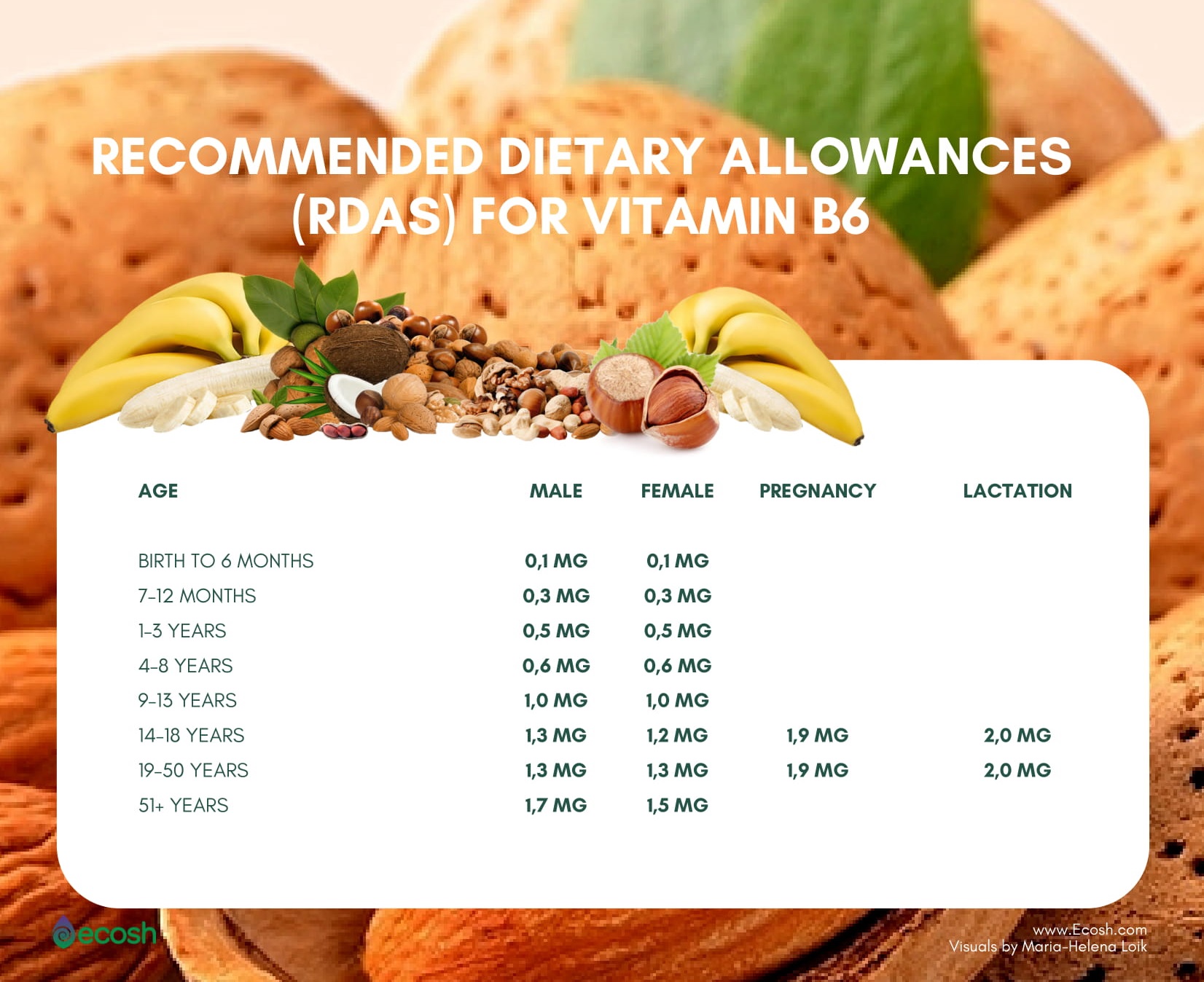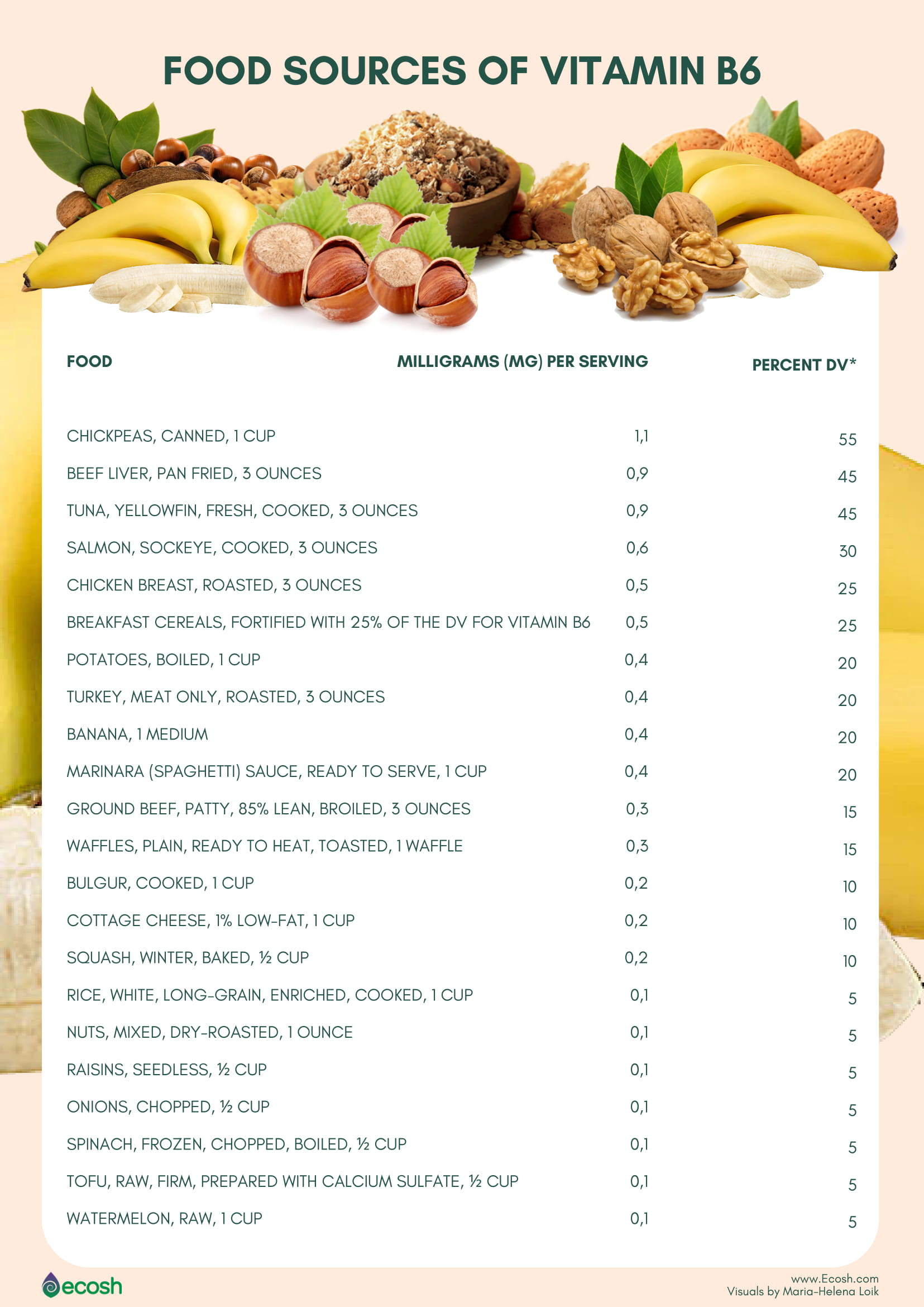Vitamin B6 is a water-soluble vitamin that is present in many natural and enriched foods. It can also be administered as a dietary supplement, if necessary. Vitamin B6 is a general name for six chemically similar compounds (vitamers) with vitamin B6 activity.
B6 has a variety of functions in our body, it takes part in over 100 enzyme reactions, and is involved in protein metabolism.
It`s deficiency in the body can cause symptoms such as mental health disorders, weakened immune system, and more disturbing consequences. How to know if you might suffer from B6 deficiency and what is the best treatment? In this profound article you`ll find the answers for all those questions.
Vitamin B6 Role in Your Body
Vitamin B6 has a lot of tasks:
- One of the central roles of this vitamin is in protein metabolism where it helps regulate the balance of amino acids in the body.
- Needed for hormone production.
- Your body requires B6 for the formation of various bioactive compounds such as serotonin, erythrocytes, hemoglobin and lymphocytes.
- Vitamin B6 plays a role in the metabolism of protein, carbohydrates and fats, the production of neurotransmitters and the formation of nicotinic acid.
- It is vital for maintaining a healthy nervous system, skin, muscles and blood.
- To a large extent, B6 levels depend on the central nervous system and hydrochloric acid productivity. It is therefore also necessary for to absorb also magnesium and vitamin B12.
- B6 is necessary for the synthesis of several neurotransmitters, heme and for the metabolism of glycogen, fatty acids and steroids.
- This vitamin is necessary for creating neurotransmitters that regulate emotions, including serotonin, dopamine and gamma-aminobutyric acid (GABA)
Vitamin B6 Benefits
B6 has been found to be particularly useful for the treatment of:
- Mood and depression – May improve mood and reduce symptoms of depression.
- Brain function and Alzheimer’s disease – B6 may prevent a decline in brain function by decreasing homocysteine levels that have been associated with Alzheimer’s disease and memory impairments. However, studies have not proven the effectiveness of B6 in improving brain health.
- Anemia – May prevent and treat anemia by aiding hemoglobin production.
- Anxiety – According to some research, high doses of B6 may be effective at decreasing anxiety and other mood issues associated with PMS due to its role in creating neurotransmitters.
- Nausea and vomiting – Vitamin B6 supplements in doses of 30–75 mg a day have been used as an effective treatment for nausea and vomiting during pregnancy.
- Clogged Arteries and Reduce Heart Disease – B6 may help reduce high homocysteine levels that lead to narrowing of arteries. This may minimize heart disease risk.
- Cancer – Some observational studies suggest a link between adequate dietary intake and blood levels of B6 and a decreased risk of certain types of cancer, but more research is needed.
- Eye Diseases – Vitamin B6 supplements may reduce your risk of age-related macular degeneration (AMD). Additionally, adequate blood levels of B6 may prevent issues that affect the retina. However, more research needs to be done.
- Rheumatoid Arthritis – Inflammation associated with rheumatoid arthritis may lower the vitamin B6 levels in blood. High doses of B6 may help correct deficiencies and reduce inflammation, but more research needs to be done to confirm these effects.
- Premenstrual Syndrome – Some evidence suggests that vitamin B6 supplements could reduce the symptoms of premenstrual syndrome (PMS), but conclusions are limited due to the poor quality of most studies.

Recommended Intake
The national recommended daily intake is 1.5-1.7 mg. Pregnant and elderly people should take up to 2mg. Children much less. Up to 1 year no more than 0.3mg, up to 3 years not more than 0.5mg and up to 13 years not more than 1mg.
Following national recommendations, these amounts should be sufficient for a healthy person to achieve the necessary level of vitamin B6 in the body. However, this vitamin also participates in the metabolism of proteins. Therefore, its significance and thus the necessity enlarges with the amount of protein consumed.
For example, athletes and people with severe physical activity need more vitamin B6 because their muscles work more. So they use larger amounts of protein to maintain and build their muscles.
Consuming multiple times higher doses of regular and long-term daily doses can cause serious sensory disturbances such as ataxia. This essentially means losing control over your physical movements. The symptoms are proportional to the size of the overdose and usually disappear when the overdose stops.
Excessive intake of vitamin B6 can also cause dermatological problems, light curves, digestive problems, and nausea.
Groups at Risk of Vitamin B6 Inadequacy
At the same time, scientists have found that the current indicative quantities are not sufficient in many groups to prevent vitamin B6 deficiency.
The following groups are among those most likely to have inadequate intakes of vitamin B6:
- Overweight people.
- Elderly.
- Pregnant women.
- Individuals with impaired renal function.
- Patients with celiac disease, Crohn’s disease, ulcerative colitis, inflammatory bowel disease, and other malabsorptive autoimmune disorders.
- People with alcohol dependence.
- Individuals with autoimmune disorders.
- Certain genetic diseases, such as homocystinuria, can also cause vitamin B6 deficiency.
- Some medications (antiepileptic drugs), can lead to deficiency over time.
Vitamin B6 Deficiency
Vitamin B6 deficiency is not very common. If the level of B6 in the body is inadequate to carry out the vital tasks, then other vitamins from the B group are probably also lacking. Vitamin B6 deficiency may cause biochemical changes in your body which have clearly recognizable symptoms.
A severe and prolonged deficiency of this vitamin can cause:
- Microcytic Anemia
- Electroencephalographic abnormalities, electromagnetic disturbances in the brain
- Mental health disorders
- Cognitive impairment
- Reduced immune response to pathological microorganisms
- Dermatitis with cheilosis (scaling on the lips and cracks at the corners of the mouth) and glossitis (swollen tongue)
- Depression and confusion
- Weakened immune function

Mild deficiency of vitamin B6 can exist for years before some symptoms begin to occur. At this time, you may experience non-specific symptoms such as fatigue, irritability and loss of mood.
In children and especially infants, the deficiency primarily manifests in weight loss, irritability, abnormally acute hearing, and convulsive seizure. In more severe cases, in anemia and convulsions.
Certain diseases that prevent the kidneys from working can also contribute to the deficit. Also, B6 levels are low due to any diseases causing absorption problems such as Crohn’s disease, celiac disease and stomach ulcers. Some hereditary diseases such as homocystinuria (a metabolic disorder of amino acids), or medicines (for example prolonged use of contraceptive and antieleptics) may also affect the absorption and overall levels of B6.
Homocysteine Reference: > 13 a. 5 – 15 µmol / l. The higher the homocysteine level in blood, the greater the chance of B6 deficiency.
The level of homocysteine in the blood increases with age. Also, it`s higher in men, smokers and people with low physical activity. This test should be considered together with vitamin B6 analysis with reference values of 5-50 µg/L.

Vitamin B6 Sources
The human body absorbs vitamin B6 from both – plant and animal food. Intestinal microflora also produces B6. The best sources of this nutrition are fish, poultry, pig and beef from animal products. Also, animal liver and egg yolk. Vegetable nuts, avocado, broccoli, paprika, potatoes, banana, bread, seeds and legumes.
If you feel that your diet is not so varied and healthy, or you belong to a risk group, you should try high quality food supplements.
There are also separate B6 vitamins as food supplements, but they are usually taken with some other mineral or vitamin such as magnesium. In this case, it is most sensible to acquire a bioactive vitamin B complex that contains vitamins throughout the group spectrum where one supports the other.
Compiled by: Maria-Helena Loik
Sources: Ods.od.nih.gov, Sciencedirect.com, Healthline.com
Photos: Pexels.com, Pixabay.com, Shutterstock.com






